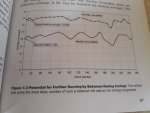The batting average, which is a measure of the runs scored by a batsman between dismissals, is a very useful measure, but it has been questioned from time to time on the grounds that unbeaten innings are not handled reasonably. How often has it been said that a batsman who finishes an innings not out has 'boosted' his batting average?
It is time this myth was put to bed. A not out innings can be looked at in two ways, either as an avoidance of an impending dismissal, or as a loss of a run-making opportunity. In the first scenario, the batting average has indeed been boosted, in the second, the potential batting average has been diminished. It can be shown that, over an entire career, the second case is more likely, reducing a batsman's potential to make easy runs when the going is good, and thus reducing rather than increasing the batting average.
Figure 7.3 shows the most likely number of runs a batsman will add as he reaches successively higher scores. The median score, probably a better indicator of the most likely outcomes, has been included on the graph.
The most likely number of runs added when a batsman is 0 is 33.68, which is equivalent to the 'average batting average' for all batsmen. As a batsman scores more runs, the most likely number of runs added becomes slightly higher than when the innings began. The implication is clear: a batsman who finishes not out has most likely been deprived of a number of runs similar or slightly higher than the batting average.
That is to say, if cricket allowed all the batsmen to play all of their unbeaten innings to completion, they would actually finish with slightly higher career batting averages. So in the long term, finishing not out is bad for your average.
An example may clarify this. Say Sachin Tendulkar plays an unbeaten innings of 50, has he boosted his batting average? The obvious answer might be yes; however if we look at all of Tendulkar's scores of 50 or more, we find that they average around 113, that is, he typically scores 63 additional runs. So if the 50* had been allowed to continue to completion, its most likely outcome would have been 113. A quick calculation will show that a dismissal for 113 would lift Tendulkar's career average more than a score of 50*. So it is likely that by stopping his innings at 50, his average was adversely affected, even though it does not count as a dismissal.
A batsman finishing not out has 'artificially boosted' his average only if it is assumed that his dismissal was imminent and inevitable. When you think about it, this is obviously a fallacy in most situations.



